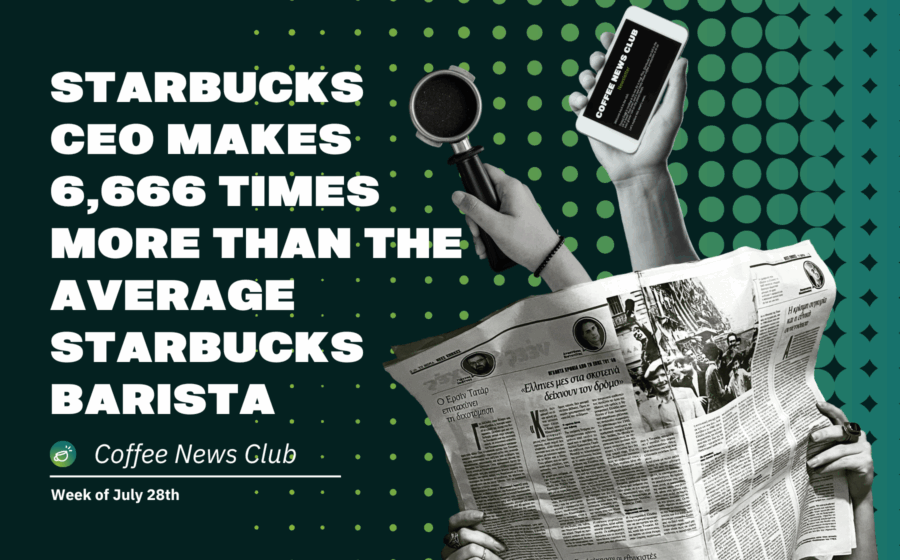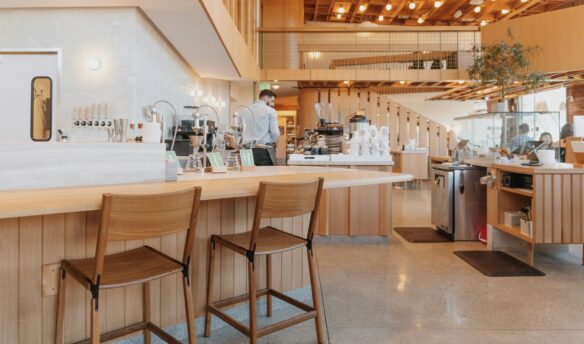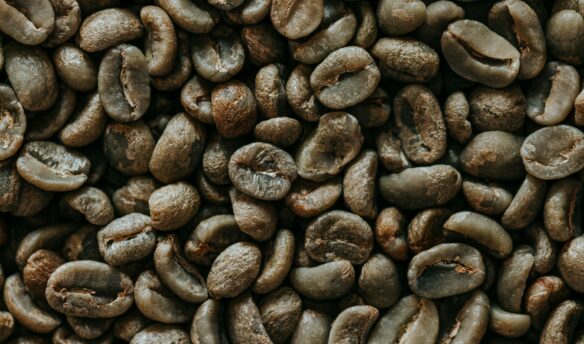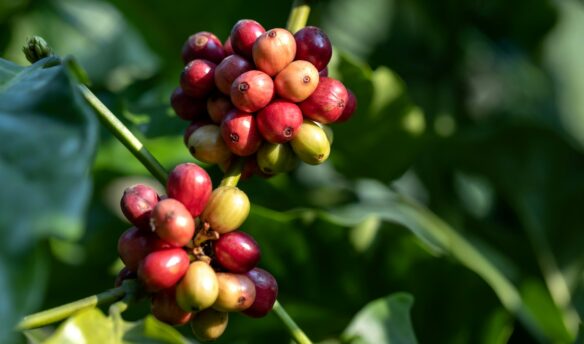Starbucks’ CEO rakes in 6,666 more than what workers earn. Plus, tariffs won’t just hurt Americans, and Disneyland Starbucks workers walk off the job.
‘Small Brazilian Coffee Producers Fear for the Future After Trump’s 50% Tariff’ – via Associated Press
News outlets have primarily focused on how Trump’s latest tariff threat—he has talked about imposing a 50% on goods from Brazil—affects U.S. coffee roasters and importers, but smallholder coffee farmers in Brazil could be hit just as hard.
Brazil is the world’s largest producer of coffee and exports the majority of its harvest to the U.S. Experts believe that, while U.S. companies will likely continue to buy coffee from Brazil, demand may fall sharply.
✉️ Receive our news roundup every week in your inbox. Sign up now. ✉️
“It’s obvious that neither the United States nor any other source can give up on Brazil, even if it’s tariffed,” Márcio Ferreira from the export association Cecafé told Eléonore Hughes and Diarlei Rodrigues reporting for the Associated Press. However, the proposed tariff is expected to change how people shop, as it will likely drive up retail prices and affect consumer demand. Such shifts will likely impact small farmers the most.
“There’s no way we can quickly redirect our coffee production to other markets,” said Leandro Gilio, a professor at Insper Business School in São Paulo. “This principally affects small producers, who have less financial power to make investments or support themselves in a period like this.”
Larger producers and exporters will be able to more easily pivot to new markets. Rory Gospill from the data analytics firm GlobalData told Global Coffee Report that Brazilian farmers should target countries like China and the Philippines, where demand for coffee is growing. “As Brazilian exporters face the potential loss of their competitive edge in the US market, it becomes imperative for them to pivot towards alternative markets that promise robust growth,” Gospill said.
After a year of volatile prices caused by a devastating drought that decimated many coffee farms, some Brazilian farmers are already struggling to stay afloat. Now, the looming tariffs add yet another layer of uncertainty. “It’s scary. It feels like you’re on shaky ground. If things get worse, what will we do? People will start pulling out their coffee and finding other ways to survive because they won’t have the means to continue,” Paulo Vitor Menezes Freitas, a young farmer, told Hughes and Rodrigues.
Read the full story on yet more tariff fallout here.
‘Bipartisan Letter From U.S. Reps Urges Coffee’s Exemption from Tariffs’ – via Daily Coffee News
While the coffee industry deals with the chaos caused by Trump’s tariffs, some are working to exclude coffee from the new import duties. The National Coffee Association has been lobbying for coffee to be exempt, while one roaster started a public petition in April that has gained over 13,000 signatures. Also in April, a bipartisan group of U.S. Representatives joined together to form the Congressional Coffee Caucus to support the industry from a trade and policy perspective.
As Nick Brown reports for Daily Coffee News, caucus members have now written a letter to United States Trade Representative Jamieson Greer, requesting that coffee be exempt from current and future tariffs. Founding members Jill Tokuda, a Democrat from Hawaii, and William Timmons, a Republican from South Carolina, told Greer in the letter that exempting coffee would protect American jobs and help a multi-billion-dollar industry that is 99% dependent on imports.
“Unlike many other goods affected by recent tariffs, coffee is not produced at a scale within the United States that can meet domestic demand,” the letter said. “Because there is no viable domestic substitute, tariffs on imported coffee create challenges for the industry.”
The letter outlines the impact of coffee on the U.S. economy. The industry supports more than 2.2 million jobs and contributes roughly $343 billion in economic output each year. The lawmakers note that tariffs risk damaging relationships with coffee-growing countries.
“As the Trump Administration continues to evaluate and shape U.S. trade policy, we urge you to remove coffee from existing and future tariff measures,” the letter concludes. The letter is signed by Tokuda, Timmons, and several other Representatives from around the country.
‘Starbucks’ CEO Made 6,666 Times More Than His Workers in 2024’ – via The Guardian
Starbucks CEO Brian Niccol made over $95 million in 2024, 6,666 times more than the average barista.
A report by the American Federation of Labor and Congress of Industrial Organizations (AFL-CIO) detailed the stark disparity in income between workers and CEOs across the 500 companies that comprise the S&P 500, an index of the 500 biggest publicly listed U.S companies. The report found that the gap between worker and CEO pay increased from 268:1 in 2023 to 285:1 in 2024. Starbucks had the second-largest gap between employee and CEO compensation, 6,666:1 (only beaten by the clothing brand Abercrombie & Fitch).
Niccol’s pay includes a base salary of $61,538, a bonus of $5 million, and an additional $90 million in stock awards. The CEO was hired in September 2024, which means he was paid that amount for just four months of work.
According to the AFL-CIO report, the typical Starbucks worker’s pay in 2024 was less than $15,000. “The median Starbucks worker would have had to start working for Starbucks in 4643 BC (during the Stone Age!) just to earn what Starbucks’ CEO earned in 2024 alone,” the report stated.
Find out more about Niccol’s pay package here.
More News
‘Arabica Coffee Advances as Weather Risks Add to Supply Concerns’ – via Bloomberg
‘Survey of 20,000 Workers Says Journalists Drink the Most Coffee’ – via Daily Coffee News
‘Starbucks Is Promoting A “Secret” Menu Because Words Mean Nothing Now’ – via Sprudge
‘Trump Tariffs Spell Trouble for Hawaii’s Few Coffee Farmers’ – via Bloomberg
‘Westrock Coffee Opens Massive Pod Factory in Arkansas’ – via Daily Coffee News
The Week in Coffee Unionizing
Starbucks workers at a location near Disneyland in Anaheim, California, walked off the job on July 19 to protest understaffing, poor working conditions, and a lack of support from management.
As reported by Julie Tremaine for SFGate, the store in the Downtown Disney District is notorious for its long lines. Some 30 million people visit Disneyland each year, and Tremaine reports that nearly all of them walk through some part of the district. Baristas at the Downtown Disney Starbucks voted to unionize in 2022.
In a video posted to Instagram, a Starbucks worker addressed CEO Brian Niccol directly, saying: “We are the ones who foster connections with customers and keep them coming back, but time and time again, you are ignoring our demands and making our jobs harder. Your priorities are all wrong. While you spend money on celebrity appearances and posh manager conferences in Las Vegas, many of us are struggling to pay rent.”
The walkout was brief and didn’t halt service entirely, but it still caught the attention of customers. One customer visiting from Colorado told the blog Disney Dining, “You don’t expect to see this here. But honestly, I support them. If they’re not being treated right, they should speak up. Even if it’s in the middle of Disneyland.”
Coffee and the Climate Crisis
Commodity coffee prices spiked earlier this year, hitting a record high of $4.30 in February. News reports linked the surge in part to prolonged droughts that reduced production in Brazil and Vietnam.
Now, a team of European scientists has confirmed that extreme weather caused by climate change contributed to the rise in the cost of coffee, among other agricultural products.
The study, published in Environmental Research Letters, found that climate change made the 2023-2024 drought in Brazil 10 to 30 times more likely, and connected that drought to the subsequent spike in coffee prices.
“Until we get to net zero emissions extreme weather will only get worse, but it’s already damaging crops and pushing up the price of food all over the world,” lead author Maximillian Kotz from the Barcelona Supercomputing Center said in a press release.
The new research follows a similar assessment by the United Nations Food and Agriculture Organization, which found that “the 2021 and 2024 increases in global coffee prices were primarily driven by supply-side disruptions, stemming from adverse weather conditions.”
Beyond the Headlines
‘Brief History of the Arabica Genome’ by Tung Nguyen
‘How Lucia Bawot’s New SANA Initiative Prioritizes Women Coffee Farmers’ Well-Being’ by Amber Gibson
‘Fifty Years Back, “Black Frost” Heralded Paraná’s Shift in Coffee Growing’ by Wilhan Santin
















